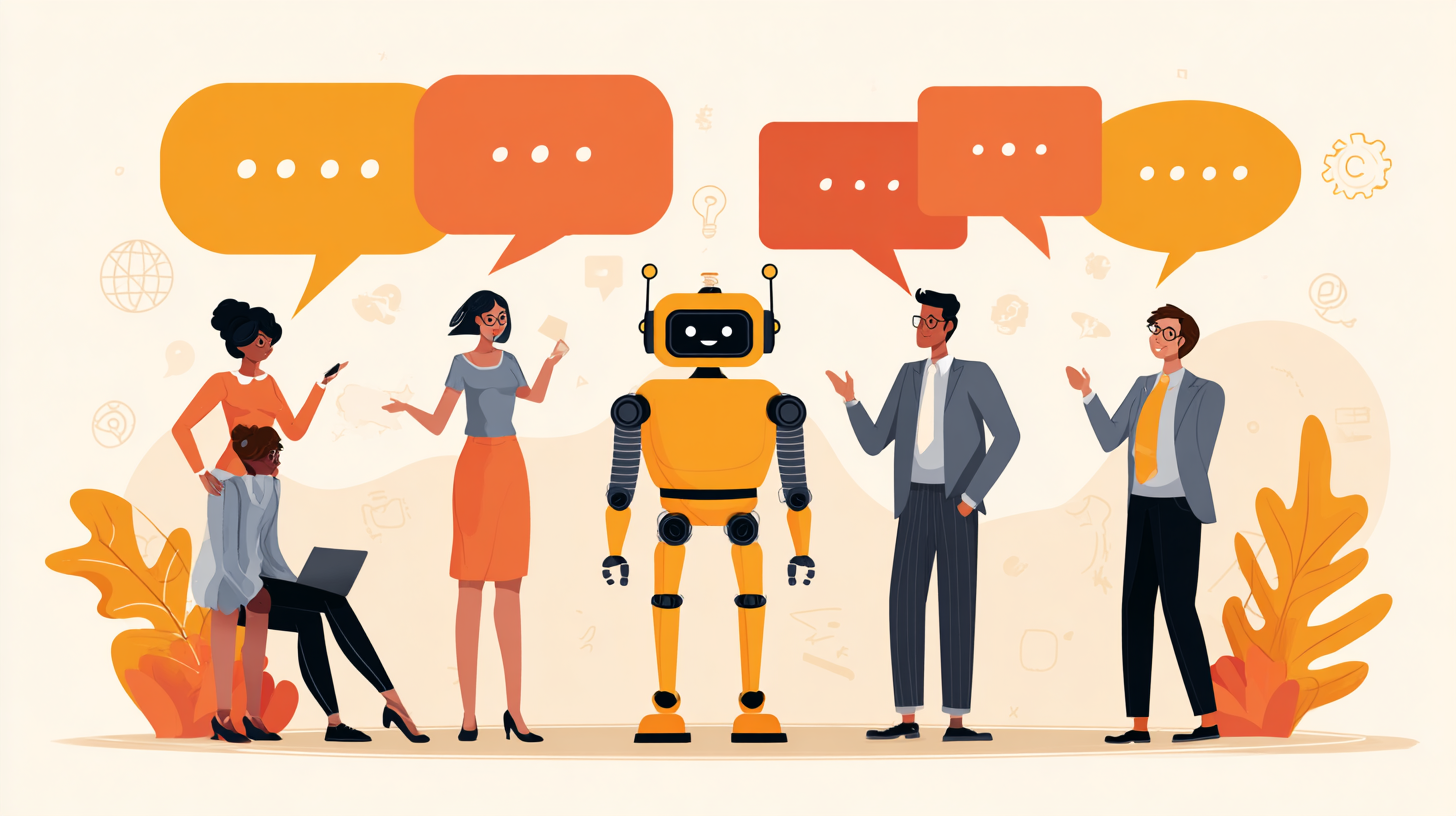
AI in Project Management: Embracing Conversational AI for Enhanced Collaboration
In today’s fast-paced world, project management is increasingly becoming reliant on technology to aid in effective collaboration. Artificial Intelligence (AI) is at the forefront of this evolution, particularly through the use of conversational AI. In this article, we’ll explore how conversational AI can enhance collaboration in project management, improve communication, and streamline processes. Whether you’re a project manager, a team leader, or a team member, understanding and leveraging these tools can transform the way you work.
Understanding Conversational AI
Conversational AI refers to technologies that enable machines to understand, process, and respond to human language in a natural way. This includes chatbots, virtual assistants, and voice recognition systems that can facilitate conversations with users. In project management, conversational AI can serve as an invaluable resource, automating routine tasks and enabling smoother communication among team members. By implementing these technologies, you can ensure better engagement and productivity in your projects.
Conversational AI systems utilize natural language processing (NLP) and machine learning to analyze user input and generate appropriate responses. This means that the more you interact with the system, the smarter and more effective it becomes. Imagine having a virtual assistant that you can communicate with in plain language, capable of answering questions, providing updates on tasks, and even reminding you of deadlines. This is the power of conversational AI in action.

The Role of AI in Project Management
You may wonder how AI fits into the overall landscape of project management. The reality is that AI has the potential to redefine project management methodologies, making them more efficient, transparent, and predictive. From work scheduling to risk management, AI can automate various processes, allowing you to focus on the tasks that matter most. It helps in analyzing data, predicting project outcomes, and generating insights that can drive better decision-making.
In recent years, the integration of AI in project management has been growing in prominence. It’s essential for you to stay aware of these advancements to keep your projects on track. For instance, AI-powered tools can analyze historical data to identify trends and patterns, helping you understand potential risks before they become problematic. This predictive capability can save both time and resources while enhancing overall project performance.
Benefits of Conversational AI in Project Management
Enhanced Communication
When you foster an environment of clear communication, collaboration can thrive. conversational AI enhances team communication by providing real-time updates and facilitating discussions. Imagine having a virtual assistant that communicates project status, shares important news, and gathers feedback from team members—all in real time. This can significantly decrease the chances of miscommunication, ensuring that everyone is on the same page.

The immediacy of conversational AI allows you to receive timely information without the usual delays associated with traditional communication methods. Whether you’re working remotely or in a shared office space, having access to this technology can streamline conversations and enhance teamwork, which is crucial for any project’s success.
Streamlined Task Management
Task management is a cornerstone of successful project management. Conversational AI tools can assist in creating, assigning, and tracking tasks seamlessly. You can simply tell your virtual assistant what needs to be done, and it takes care of the logistics. When you want to check on task progression, your AI can promptly provide updates, freeing up your time for strategic decision-making.
Moreover, because conversational AI can learn from your interactions, it can suggest optimal ways to prioritize tasks based on deadlines, team members’ workloads, and project goals, making task management not only easier but more strategic.
Increased Efficiency
One of the most significant benefits of conversational AI is increased efficiency. By automating repetitive tasks such as scheduling meetings, sending out reminders, or compiling reports, conversational AI allows you to focus on more critical aspects of your projects. Think of it as your personal assistant, handling the routine activities that tend to occupy your day.
For project managers like yourself, this enhanced efficiency translates into reduced workloads and improved team morale. When you eliminate mundane tasks from your to-do list, you enable yourself and your team to dedicate more energy towards innovation and problem-solving. The end result is smoother project execution and higher quality outcomes.
Improved Decision-Making
Data-driven decision-making is essential in project management, and conversational AI can play a vital role in this area. With the ability to gather and analyze vast amounts of data in a fraction of the time it would take a human, conversational AI can provide insights and recommendations tailored to your specific needs.

These insights can make a real difference, especially when you’re faced with critical decisions that could impact project outcomes. Instead of relying on gut feelings or past experiences alone, you can base your choices on real-time data analysis. This informed approach not only enhances project outcomes but also increases your credibility as a leader.
Facilitation of Collaboration
Collaboration among team members is essential for meeting project goals. Conversational AI can serve as a platform for collaboration, where team members can pose questions, share ideas, and seek clarification—all while keeping relevant records. Essentially, the AI acts as a bridge, connecting team members regardless of their location or time zone.
With conversational AI handling the logistics of communication, you can create an inclusive environment where everyone feels heard and engaged. This not only strengthens team cohesion but also nurtures innovative thinking as ideas flow freely from all directions.
Embracing AI Awareness Training
While AI technology offers numerous benefits, it’s essential to implement it with an understanding of its implications. This is where AI awareness training comes into play. By providing training sessions to your team members on how to effectively use AI tools, you empower them to make the most out of these technologies. They can engage with conversational AI confidently and efficiently, ensuring that its integration into your project management workflows is seamless.
AI awareness training can cover a range of topics from identifying suitable AI tools for your project needs to understanding data ethics. As team members grow more familiar with AI applications, they can better harness their power, leading to improved collaboration and project performance.
The Challenges of Integration
While there are many advantages to using conversational AI, some challenges may arise during the implementation and integration phases. You might encounter resistance from team members who are unfamiliar or skeptical about AI technology. It’s crucial to address these concerns through education and open communication so that all team members can appreciate the value that conversational AI brings to their roles.
Additionally, AI models require quality data to produce effective results. If your organization struggles to maintain and manage data, you may encounter difficulties. This highlights the importance of ensuring that your data governance policies align with AI frameworks.
Ethical Considerations
When embracing AI, it’s crucial to think about ethical considerations. Conversational AI systems are designed to learn from data, which could introduce biases if not managed properly. It’s your responsibility to ensure that the AI systems your team uses are fair and transparent. Make it a point to set ethical guidelines for AI deployment in your projects to mitigate risks and promote a more responsible AI culture within your team.
Leveraging AI-Enhanced User Experiences in Project Management Tools
Many project management tools now come integrated with AI capabilities, offering features designed to enhance user experiences. These tools are often designed with intuitive interfaces that make it easy for you and your team to navigate while utilizing complex AI functionalities.
Real-Time Resource Allocation
Project management tools enhanced with AI can help you allocate resources more effectively. By analyzing historical data and current project requirements, these platforms can suggest the most efficient use of your team’s time and skills. You can make informed decisions about who should tackle specific tasks or whether additional resources are needed at particular stages of your projects.
Predictive Analysis
AI-powered project management tools can offer predictive analysis to help you foresee potential bottlenecks or roadblocks. By scrutinizing previous data, these systems can help you identify patterns that lead to delays or project failures. This foresight enables you to proactively address issues before they hinder your project’s progress.
Seamless Integration with Existing Tools
Most contemporary project management systems are designed to integrate smoothly with existing tools that your team already relies on. The integration of conversational AI can enhance the utility of platforms like Slack, Asana, or Trello. With the ability to communicate verbally and receive instant feedback, you can maximize the capability of these tools, making your team’s collaboration more fluid and effective.
Future Trends in AI and Project Management
As the field of AI continues to evolve, it’s essential for you to stay abreast of the trends that can shape the future of project management. Understanding these trends not only prepares you for the changing landscape but also enhances your credibility as a leader in your field.
Increased Adoption of Chatbots
Chatbots are becoming more prevalent in project management, serving as the first line of communication for inquiries and information. As these technologies become more sophisticated, you can expect chatbots to handle complex queries, making them an invaluable asset in your project management toolbox.
Enhanced Collaborative Workspaces
As hybrid and remote work become the norm, the need for enhanced collaborative workspaces will likely continue to grow. AI technologies will play a crucial role in creating virtual environments that enable project teams to collaborate efficiently, no matter where they are located. Considering how conversational AI can facilitate real-time communication, group dynamics, and brainstorming sessions could change how you approach team meetings.
AI’s Role in Decision Support Systems
Decision support systems powered by AI will increasingly influence the strategic aspects of project management. As these systems can analyze vast datasets to provide insights, they will shift the dynamics of decision-making from subjective analysis to data-driven conclusions. This trend will empower you to lead your team with confidence and bolster the success of your projects.
The Importance of Regulatory Awareness
As you delve deeper into the world of AI in project management, it’s essential to consider regulatory awareness. With the growth of AI technologies comes an evolving landscape of laws and regulations regarding their use. It’s important for you and your team to stay informed about the local and global regulations that govern AI and data use.
Understanding these regulations will not only help protect your organization from potential legal issues, but it will also build trust with your clients. When stakeholders see that you prioritize compliance and ethical practices, it boosts your credibility as a project leader, which can open doors for future collaborations.
Connecting with AI Enthusiasts
To further enhance your understanding of AI and its role in project management, consider connecting with others in the field. Networking with AI enthusiasts and professionals can provide you with insights into best practices, emerging technologies, and lessons learned from past projects. Building a community where you can exchange ideas and collaborate on impactful initiatives can amplify the benefits of conversational AI in your work.
Conclusion
Embracing conversational AI in project management isn’t just a trend—it’s a smart strategy that can enhance collaboration, improve efficiency, and ultimately lead to better project outcomes. By leveraging the capabilities of AI technologies, you’re positioned to transform the way your team communicates and operates, paving the way for innovative solutions and greater success.
Whether you’re just dipping your toes in the AI pool or are looking to deepen your knowledge, remember that the future is here, and it’s conversational. So, take the plunge, embrace these tools, and watch your project management skills soar!
If you found this article helpful, please clap, leave a comment, and subscribe to my Medium newsletter for updates on AI, project management, and related topics. Your engagement means a lot!
